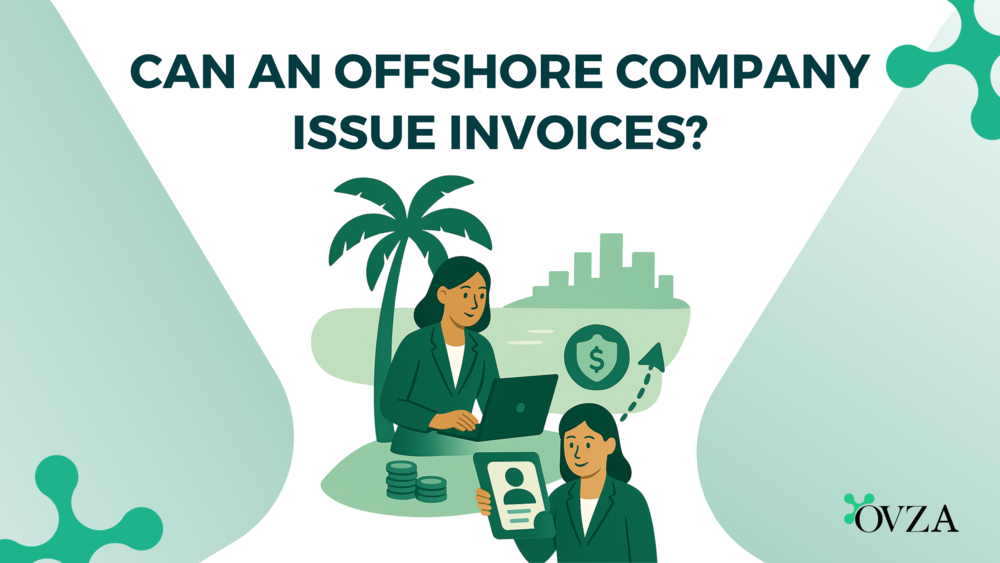Yes, An offshore company can issue legal invoices to international clients when properly structured and compliant.
Can an offshore company issue invoices? This is one of the most common questions asked by entrepreneurs, remote service providers, and international consultants. The short answer is yes — an offshore company can absolutely issue invoices, provided it is a legally registered entity and operated within the rules of its jurisdiction. In fact, invoicing is one of the core functions of many offshore companies formed by global businesses.
Why Use an Offshore Company for Invoicing?
There are several practical and strategic reasons why someone might choose to invoice clients through an offshore company. For digital entrepreneurs and consultants, the ability to invoice internationally without being tied to a high-tax jurisdiction or restrictive local banking laws is a major advantage. Offshore companies allow you to operate a borderless business while maintaining financial privacy, corporate flexibility, and in many cases, tax neutrality.
Offshore structures also offer a clear separation between your personal income and business earnings. Instead of using your personal name or local freelance registration, you can present invoices from a professionally registered offshore company — which helps build trust with international clients and partners.
Many service providers, such as marketing agencies, software developers, content creators, and management consultants, use offshore companies to issue invoices for cross-border engagements. These companies typically operate online, have clients in multiple countries, and need a streamlined way to manage billing, contracts, and payments. An offshore company makes this possible without unnecessary bureaucracy or double taxation.
Clients who receive an invoice from a properly registered offshore company generally have no problem making payment, so long as the invoice is well formatted and includes the necessary legal details. Having an offshore company also enables you to receive funds into a business bank account or EMI (Electronic Money Institution) account, keeping your operations clean and scalable.
What Makes an Offshore Company Invoice Legally Valid?
To ensure that an offshore company can issue invoices legally and professionally, the structure must meet basic international business standards. That means the offshore company must be properly incorporated in its jurisdiction, have an active registered agent, and maintain good standing. Without these, any invoices issued could be challenged as invalid — especially by banks or regulatory bodies.
The invoice itself should look like any standard business invoice. It must clearly identify the offshore company issuing the invoice, including the official company name, registration number, and the jurisdiction where it’s incorporated. Clients expect this level of transparency, and banks or financial institutions may request this information when reviewing payments.
Equally important is ensuring that the payment terms and methods listed are compatible with global banking. If you’re using an offshore company to invoice clients in Europe or North America, it’s best to include details like SWIFT wire instructions, IBAN (if applicable), or accounts with international EMIs such as Wise or DNBC. Offshore companies can typically receive payments through these channels with no issues — especially if the company is clearly presented and legally maintained.
From a compliance standpoint, most offshore jurisdictions do not restrict companies from invoicing foreign clients. However, some require that the company’s business activity matches its stated object clauses (listed in the incorporation documents). For example, if your offshore company is registered to provide “digital marketing services,” invoicing for unrelated services like import/export or physical products might raise red flags — especially if you’re audited or asked to justify business activity by a bank.
Can Offshore Companies Invoice Without VAT?
In many cases, yes. Offshore companies registered in tax-neutral jurisdictions like the British Virgin Islands, Belize, or Seychelles generally don’t charge VAT or sales tax — because those taxes aren’t applicable in those jurisdictions for offshore income. This can be a competitive advantage when working with international clients, especially in countries where VAT is high.
Still, it’s essential to make clear on your invoices that VAT is not applicable due to the company’s jurisdiction. This helps prevent confusion or disputes, particularly with European clients who may be accustomed to seeing VAT lines on every invoice. If your offshore company operates in a jurisdiction where VAT or GST applies, or if you register for VAT voluntarily, it must be handled accordingly and reflected in your invoicing.
Conclusion
So, can an offshore company issue invoices? Absolutely — and more importantly, it can do so legally and efficiently if set up correctly. An offshore company invoice is not just a billing tool; it’s a strategic gateway to running a global business, separating personal and business finances, and simplifying international payments.
Disclaimer: The information provided on this website is intended for general reference and educational purposes only. While OVZA makes every effort to ensure accuracy and timeliness, the content should not be considered legal, financial, or tax advice.








